Analytical Essay
Definition of analytical essay.
Analytical implies the breaking down of something into parts, or the discussion of something in a way that it becomes a dissection of the whole. An analytical type of essay differs from other types of essays in that its primary goal is to explain something bit by bit to enhance understanding. Most of the times, an analytical essay is written about the analysis of a text, or a process, or an idea. In literature, however, it is a critical analysis of some literary text which is done to enhance its understanding.

Difference Between an Analytical Essay and a Critical Essay
An analytical essay is just an analysis of a literary text. By contrast , a critical essay involves, not only an analysis of the text in question, but also dissection of the literary terms and devices used by the author to make his meanings clear. The critical essay also explains the functions of the literary terms used, and evaluates their usage, and whether they have achieved the intended purposes or not.
Types of Analytical Essay
- Cause and Effect : One way of analyzing something is to discuss the cause of something, and its effect on other things.
- Comparison and Contrast : Another way of analyzing something is to compare and contrast things among themselves.
- Classification : Classification is yet another method of analyzing things, to learn of their nature.
- Process : Process is also a type of analysis writing.
- Definition : Defining things is also a way of analyzing the nature of things.
Examples of Analytical Essay in Literature
Example #1: liposuction: the key to energy independence (by barbara ehrenreich).
“I say to my fellow humans: It’s time to stop feeding off the dead and grow up! I don’t know about food, but I have a plan for achieving fuel self-sufficiency in less time than it takes to say ‘Arctic National Wildlife Refuge.’ The idea came to me from reports of the growing crime of French fry oil theft: Certain desperate individuals are stealing restaurants’ discarded cooking oil, which can then be used to fuel cars. So the idea is: why not skip the French fry phase and harvest high-energy hydrocarbons right from ourselves?”
This is an excerpt from the essay of Barbara Ehrenreich, in which she has made comparison and contrast between human beings and animals , regarding food choices . This is a good analysis of the food we use.
Example #2: Freedom (by Joyce M. Jarett)
“On the first day of school, I was escorted by hordes of national guardsmen. Like a funeral procession, the steady stream of official-looking cars followed me to the campus. Some patrolmen were parked near campus gates, while others, with guns strapped to their sides, stood near building entrances. Though many of my escorts had given me smiles of support, still I was not prepared for what I encountered upon entering my new school.”
This is a paragraph from a process analysis. The author, Joyce M. Jaret, has beautifully described her experience of the security in this paragraph, and how it is deployed when an important figure faces security issues in his life. This is an analysis of the process of security deployment.
Example #3: The Ways of Meeting Oppression (by Martin Luther King, Jr.)
“The third way open to oppressed people in their quest for freedom is the way of nonviolent resistance. Like the synthesis in Hegelian philosophy, the principle of nonviolent resistance seeks to reconcile the truths of two opposites—the acquiescence and violence—while avoiding the extremes and immoralities of both. The nonviolent resister agrees with the person who acquiesces that one should not be physically aggressive toward his opponent; but he balances the equation by agreeing with the person of violence that evil must be resisted. He avoids the nonresistance of the former and the violent resistance of the latter. With nonviolent resistance, no individual or group need submit to any wrong, nor need anyone resort to violence in order to right a wrong.”
This is the analysis by classification that Marth Luther King, a famous human rights activist, has done regarding oppression against African Americans.
Function of Analytical Essay
An analytical essay dissects something such as a concept, an idea, a thing, or even a character . Its major aim is to enhance the understanding of readers. An analysis could be done through a process, definition, classification and division, or comparison and contrast. The thing or idea is broken into several parts, through classification and division, and then analyzed. A process is broken into several steps for analysis. Not only do analytical essays enhance understanding, but they also make readers aware of minute details of things.
Related posts:
- Elements of an Essay
- Narrative Essay
- Definition Essay
- Descriptive Essay
- Types of Essay
- Argumentative Essay
- Cause and Effect Essay
- Critical Essay
- Expository Essay
- Persuasive Essay
- Process Essay
- Explicatory Essay
- An Essay on Man: Epistle I
- Comparison and Contrast Essay
Post navigation

Short Story Analysis Essay
Short story analysis essay generator.
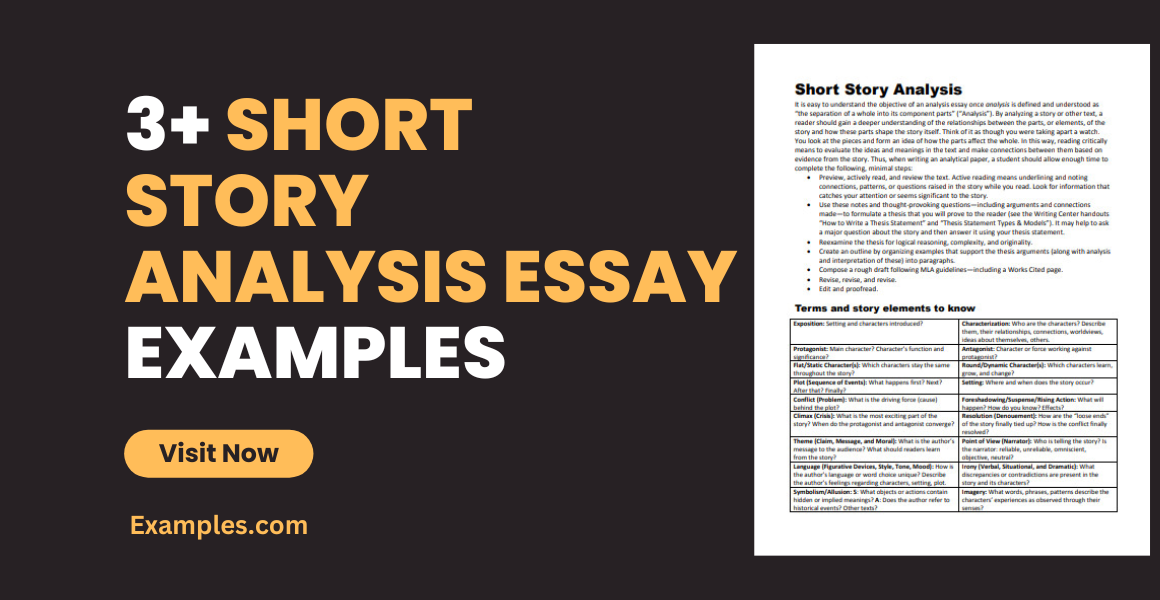
Almost everyone has read a couple of short stories from the time they were kids up until today. Although, depending on how old you are, you analyze the stories you read differently. As a kid, you often point out who is the good guy and the bad guy. You even express your complaints if you do not like the ending. Now, in high school or maybe in college, you pretty much do the same, but you need to incorporate your critical thinking skills and follow appropriate formatting. That said, to present the results of your literature review, compose a short story analysis essay.
3+ Short Story Analysis Essay Examples
1. short story analysis essay template.
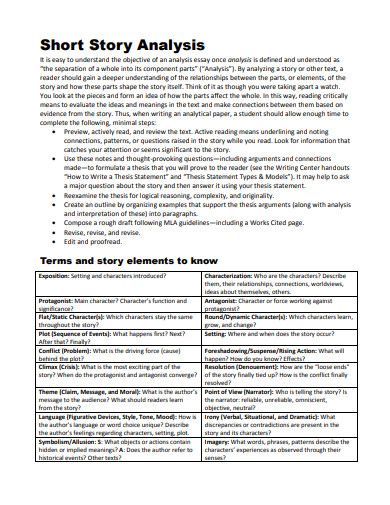
Size: 310 KB
2. Sample Short Story Analysis Essay
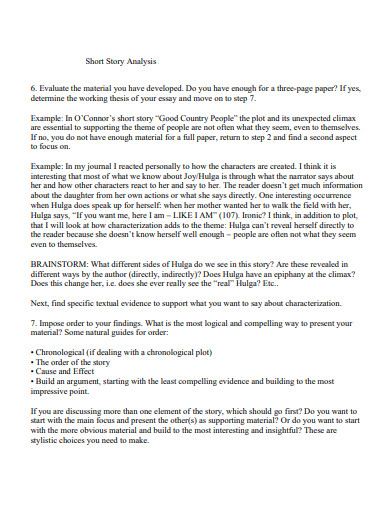
Size: 75 KB
3. Short Story Analysis Essay Example
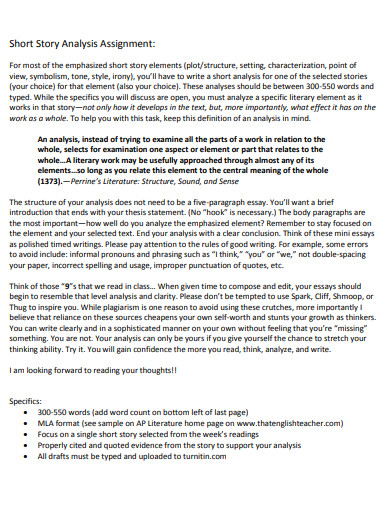
Size: 298 KB
4. Printable Short Story Analysis Essay
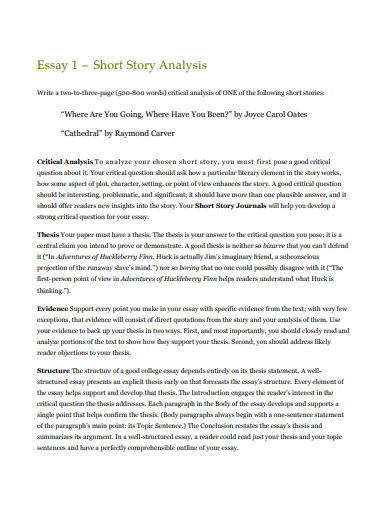
Size: 121 KB
What Is a Short Story Analysis Essay?
A short story analysis essay is a composition that aims to examine the plot and the aspects of the story. In writing this document, the writer needs to take the necessary elements of a short story into account. In addition, one purpose of writing this type of analysis essay is to identify the theme of the story. As well as try to make connections between the different aspects.
How to Compose a Critical Short Story Analysis Essay
Having the assignment to write a short story analysis can be overwhelming. Reading the short story is easy enough. Evaluating and writing down your essay is the challenging part. A short story analysis essay follows a different format from other literature essays . That said, to help with that, here are instructive steps and helpful tips.
1. Take Down Notes
Considering that you have read the short story a couple of times, the first step you should take before writing your essay is to summarize and write down your notes. To help you with this, you can utilize flow charts to determine the arcs the twists of the short story. Include the parts and segments that affected you the most, as well as the ones that hold significance for the whole story.
2. Compose Your Thesis Statement
Before composing your thesis statement for the introductory paragraph of your essay, first, you need to identify the thematic statement of the story. This sentence should present the underlying message of the entire literature. It is where the story revolves around. After that, you can use it as a basis and proceed with composing your thesis statement. It should provide the readers an overview of the content of your analysis paper.
3. Analyze the Concepts
One of the essential segments of your paper is, of course, the analysis part. In the body of your essay, you should present arguments that discuss the concepts that you were able to identify. To support your point, you should provide evidence and quote sentences from the story. If you present strong supporting sentences, it will make your composition more effective. To help with the organization and the structure, you can utilize an analysis paper outline .
4. Craft Your Conclusion
The last part of the process is to craft a conclusion for your essay . Aside from restating the crucial points and the thesis statement, there is another factor that you should consider for the ending paragraph. That said, you should also present your understanding regarding why the author wrote the story that way. In addition, you can also wrap it up by expressing how the story made you feel.
How to run an in-depth analysis of a short story?
In analyzing a short story, you should individually examine the elements of a short story. That said, you need to study the characters, setting, tone, and plot. In addition, you should also consider evaluating the author’s point of view, writing style, and story-telling method. Also, it involves studying how the story affects you personally.
Why is it necessary to compose analysis essays?
Composing analysis essays tests how well a person understands a reading material. It is a good alternative for reading comprehension worksheets . Another advantage of devising this paper is it encourages people to look at a story from different angles and perspectives. In addition to this, it lets the students enhance their article writing potential.
What is critical writing?
Conducting a critical analysis requires an individual to examine the details and facts in the literature closely. It involves breaking down ideas as well as linking them to develop a point or argument. Despite that, the prime purpose of a critical essay is to give a literary criticism of the things the author did well and the things they did poorly.
People enjoy reading short stories. It is for the reason that aside from being brief, they also present meaningful messages and themes. In addition to that, it also brings you to a memorable ride with its entertaining conflicts and plot twists. That said, as a sign of respect to the well-crafted literature, you should present your thoughts about it by generating a well-founded short story analysis essay.
Text prompt
- Instructive
- Professional
Short Story Analysis Essay on the theme of courage in
Short Story Analysis Essay on symbolism in
How To Write an Analytical Essay

If you enjoy exploring topics deeply and thinking creatively, analytical essays could be perfect for you. They involve thorough analysis and clever writing techniques to gain fresh perspectives and deepen your understanding of the subject. In this article, our expert research paper writer will explain what an analytical essay is, how to structure it effectively and provide practical examples. This guide covers all the essentials for your writing success!
What Is an Analytical Essay
An analytical essay involves analyzing something, such as a book, movie, or idea. It relies on evidence from the text to logically support arguments, avoiding emotional appeals or personal stories. Unlike persuasive essays, which argue for a specific viewpoint, a good analytical essay explores all aspects of the topic, considering different perspectives, dissecting arguments, and evaluating evidence carefully. Ultimately, you'll need to present your own stance based on your analysis, synthesize findings, and decide whether you agree with the conclusions or have your own interpretation.

Wednesday Addams
Mysterious, dark, and sarcastic
You’re the master of dark humor and love standing out with your unconventional style. Your perfect costume? A modern twist on Wednesday Addams’ gothic look. You’ll own Halloween with your unapologetically eerie vibe. 🖤🕸️
Wondering How to Impress Your Professor with Your Essay?
Let our writers craft you a winning essay, no matter the subject, field, type, or length!
How to Structure an Analytical Essay
Crafting an excellent paper starts with clear organization and structuring of arguments. An analytical essay structure follows a simple outline: introduction, body, and conclusion.
Introduction: Begin by grabbing the reader's attention and stating the topic clearly. Provide background information, state the purpose of the paper, and hint at the arguments you'll make. The opening sentence should be engaging, such as a surprising fact or a thought-provoking question. Then, present your thesis, summarizing your stance in the essay.
Body Paragraphs: Each paragraph starts with a clear topic sentence guiding the reader and presents evidence supporting the thesis. Focus on one issue per paragraph and briefly restate the main point at the end to transition smoothly to the next one. This ensures clarity and coherence in your argument.
Conclusion: Restate the thesis, summarize key points from the body paragraphs, and offer insights on the significance of the analysis. Provide your thoughts on the topic's importance and how your analysis contributes to it, leaving a lasting impression on the reader.
Meanwhile, you might also be interested in how to write a reflection paper , so check out the article for more information!
How to Write an Analytical Essay in 6 Simple Steps
Once you've got a handle on the structure, you can make writing easier by following some steps. Preparing ahead of time can make the process smoother and improve your essay's flow. Here are some helpful tips from our experts. And if you need it, you can always request our experts to write my essay for me , and we'll handle it promptly.
.webp)
Step 1: Decide on Your Stance
Before diving into writing, it's crucial to establish your stance on the topic. Let's say you're going to write an analytical essay example about the benefits and drawbacks of remote work. Before you start writing, you need to decide what your opinion or viewpoint is on this topic.
- Do you think remote work offers flexibility and improved work-life balance for employees?
- Or maybe you believe it can lead to feelings of isolation and decreased productivity?
Once you've determined your stance on remote work, it's essential to consider the evidence and arguments supporting your position. Are there statistics or studies that back up your viewpoint? For example, if you believe remote work improves productivity, you might cite research showing increased output among remote workers. On the other hand, if you think it leads to isolation, you could reference surveys or testimonials highlighting the challenges of remote collaboration. Your opinion will shape how you write your essay, so take some time to think about what you believe about remote work before you start writing.
Step 2: Write Your Thesis Statement
Once you've figured out what you think about the topic, it's time to write your thesis statement. This statement is like the main idea or argument of your essay.
If you believe that remote work offers significant benefits, your thesis statement might be: 'Remote work presents an opportunity for increased flexibility and work-life balance, benefiting employees and employers alike in today's interconnected world.'
Alternatively, if you believe that remote work has notable drawbacks, your thesis statement might be: 'While remote work offers flexibility, it can also lead to feelings of isolation and challenges in collaboration, necessitating a balanced approach to its implementation.'
Your thesis statement guides the rest of your analytical essay, so make sure it clearly expresses your viewpoint on the benefits and drawbacks of remote work.
Step 3: Write Topic Sentences
After you have your thesis statement about the benefits and drawbacks of remote work, you need to come up with topic sentences for each paragraph while writing an analytical essay. These sentences introduce the main point of each paragraph and help to structure your essay.
Let's say your first paragraph is about the benefits of remote work. Your topic sentence might be: 'Remote work offers employees increased flexibility and autonomy, enabling them to better manage their work-life balance.'
For the next paragraph discussing the drawbacks of remote work, your topic sentence could be: 'However, remote work can also lead to feelings of isolation and difficulties in communication and collaboration with colleagues.'
And for the paragraph about potential solutions to the challenges of remote work, your topic sentence might be: 'To mitigate the drawbacks of remote work, companies can implement strategies such as regular check-ins, virtual team-building activities, and flexible work arrangements.'
Each topic sentence should relate back to your thesis statement about the benefits and drawbacks of remote work and provide a clear focus for the paragraph that follows.
Step 4: Create an Outline
Now that you have your thesis statement and topic sentences, it's time to create an analytical essay outline to ensure your essay flows logically. Here's an outline prepared by our analytical essay writer based on the example of discussing the benefits and drawbacks of remote work:
Step 5: Write Your First Draft
Now that you have your outline, it's time to start writing your first draft. Begin by expanding upon each point in your outline, making sure to connect your ideas smoothly and logically. Don't worry too much about perfection at this stage; the goal is to get your ideas down on paper. You can always revise and polish your draft later.
As you write, keep referring back to your thesis statement to ensure that your arguments align with your main argument. Additionally, make sure each paragraph flows naturally into the next, maintaining coherence throughout your essay.
Once you've completed your first draft, take a break and then come back to review and revise it. Look for areas where you can strengthen your arguments, clarify your points, and improve the overall structure and flow of your essay.
Remember, writing is a process, and it's okay to go through multiple drafts before you're satisfied with the final result. Take your time and be patient with yourself as you work towards creating a well-crafted essay on the benefits and drawbacks of remote work.
Step 6: Revise and Proofread
Once you've completed your first draft, it's essential to revise and proofread your essay to ensure clarity, coherence, and correctness. Here's how to approach this step:
- Check if your ideas make sense and if they support your main point.
- Make sure your writing style stays the same and your format follows the rules.
- Double-check your facts and make sure you've covered everything important.
- Cut out any extra words and make your sentences clear and short.
- Look for mistakes in spelling and grammar.
- Ask someone to read your essay and give you feedback.
What is the Purpose of an Analytical Essay?
Analytical essays aim to analyze texts or topics, presenting a clear argument. They deepen understanding by evaluating evidence and uncovering underlying meanings. These essays promote critical thinking, challenging readers to consider different viewpoints.
They're also great for improving critical thinking skills. By breaking down complex ideas and presenting them clearly, they encourage readers to think for themselves and reach their own conclusions.
This type of essay also adds to academic discussions by offering fresh insights. By analyzing existing research and literature, they bring new perspectives or shine a light on overlooked parts of a topic. This keeps academic conversations lively and encourages more exploration in the field.
Analytical Essay Examples
Check out our essay samples to see theory in action. Crafted by our dissertation services , they show how analytical thinking applies to real situations, helping you understand concepts better.
With our tips on how to write an analytical essay, you're ready to boost your writing skills and craft essays that captivate your audience. With practice, you'll become a pro at analytical writing, ready to tackle any topic with confidence. And, if you need help to buy essay online , just drop us a line saying ' do my homework for me ' and we'll jump right in!
Do Analytical Essays Tend to Intimidate You?
Give us your assignment to uncover a deeper understanding of your chosen analytical essay topic!
How to Write an Analytical Essay?
What is an analytical essay.

Daniel Parker
is a seasoned educational writer focusing on scholarship guidance, research papers, and various forms of academic essays including reflective and narrative essays. His expertise also extends to detailed case studies. A scholar with a background in English Literature and Education, Daniel’s work on EssayPro blog aims to support students in achieving academic excellence and securing scholarships. His hobbies include reading classic literature and participating in academic forums.

is an expert in nursing and healthcare, with a strong background in history, law, and literature. Holding advanced degrees in nursing and public health, his analytical approach and comprehensive knowledge help students navigate complex topics. On EssayPro blog, Adam provides insightful articles on everything from historical analysis to the intricacies of healthcare policies. In his downtime, he enjoys historical documentaries and volunteering at local clinics.
.webp)
Analytical Essay: Definition, Types, Format & How-To Guide
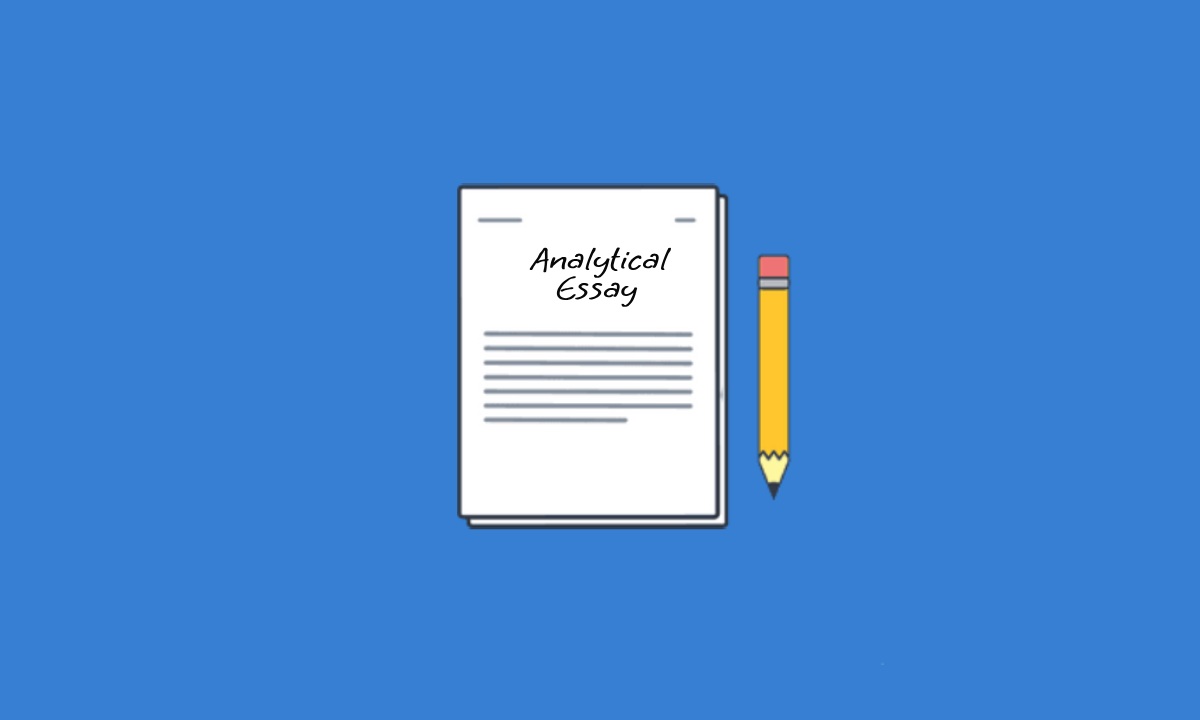
What is Analytical Essay?
An analytical essay is a type of writing that involves breaking down and examining a particular subject, such as a piece of literature, a movie, an event, or a concept, in detail. The goal of this essay is not merely to summarize the subject but to analyze and interpret it by focusing on its essential elements, such as themes, characters, arguments, or structure.
Table of Contents
Analytical Essay Types:
Analytical essays come in several types, each designed to analyze different kinds of material or to approach analysis from a unique angle. Below are some common types of analytical essays:
1. Literary Analysis Essay
A literary analysis essay focuses on analyzing a specific piece of literature, such as a novel, poem, play, or short story. The goal is to break down elements of the work—such as character development, themes, symbolism, setting, or plot—and examine how these aspects contribute to the overall meaning or message of the text. For example, you might explore how symbolism in a novel reflects the protagonist’s internal struggle or how a poem’s structure enhances its emotional impact.
2. Rhetorical Analysis Essay
In a rhetorical analysis essay, the focus is on analyzing how an author or speaker uses rhetoric to persuade or influence an audience. This involves examining the use of ethos (credibility), pathos (emotional appeal), and logos (logical reasoning) within speeches, advertisements, or other forms of communication. For instance, you might analyze a famous speech, identifying how the speaker uses persuasive techniques to build an argument and appeal to the audience’s emotions.
3. Character Analysis Essay
A character analysis essay focuses on one or more characters in a literary work, film, or other narrative form. The objective is to analyze the character’s personality, motivations, relationships, and growth throughout the story. This type of essay often examines how the character’s traits influence their actions and the overall plot, as well as how they contribute to the themes of the work. For example, you might write a character analysis of Hamlet, exploring how his indecision and inner conflict affect his downfall.
4. Process Analysis Essay
A process analysis essay examines and explains how something is done or how something works, often step by step. This type of essay is less about forming an argument and more about providing a detailed explanation of a process. The analysis might cover everything from a scientific method to a cooking recipe, or how an organization runs. For example, you could analyze the steps involved in conducting an experiment or creating a successful business plan.
5. Cause and Effect Analysis Essay
This type of essay examines the causes of a particular event or phenomenon and its effects. In a cause-and-effect analysis, you explore the relationship between variables, looking at how one event leads to another. This type of essay is often used to understand social, historical, or scientific phenomena. For example, you could analyze the causes of climate change and its potential impact on global ecosystems, or explore how technological advancements have influenced modern education.
6. Comparative Analysis Essay
A comparative analysis essay compares two or more subjects, ideas, or texts, highlighting their similarities and differences. The goal is to provide an in-depth examination that allows for a greater understanding of the subjects. Comparative essays can be applied to literature, historical events, theories, or other forms of analysis. For instance, you might compare two novels, analyzing how each explores themes of identity or freedom.
7. Critical Analysis Essay
A critical analysis essay evaluates a piece of work, idea, or issue in a detailed and objective manner. The goal is to assess the strengths and weaknesses of the material being analyzed. This type of essay requires the writer to engage with the work on a deeper level, offering insights beyond surface-level observations. For example, you could write a critical analysis of a film, discussing its direction, cinematography, and thematic elements while also offering your own perspective on its effectiveness.
8. Poetry Analysis Essay
A poetry analysis essay focuses specifically on dissecting a poem’s structure, form, language, and meaning. In this type of essay, the writer explores how the poet uses literary devices—such as meter, rhyme, imagery, and figurative language—to convey emotion or thematic depth. The essay might also explore how the poem fits within a particular literary movement or how it reflects the poet’s historical context.
Analytical Essay Format:
An analytical essay format typically follows a structured outline to present a clear argument and analysis. Here’s a common format:

1. Introduction
Hook: A compelling opening to engage the reader (quote, fact, question). Background Information: Brief context about the text, issue, or topic being analyzed. Thesis Statement: A clear and concise statement that outlines the main argument or point of analysis.
2. Body Paragraphs (usually 3-5 paragraphs)
Each paragraph should focus on a single point that supports the thesis.
Topic Sentence: Introduces the main idea of the paragraph. Evidence: Provide quotes, data, or examples from the text or research to support the claim. Analysis: Explain how the evidence supports your argument, providing critical insights or interpretation. Transition: Smoothly link to the next paragraph.
3. Counterargument and Refutation (Optional)
Counterargument: Present a viewpoint that opposes your thesis. Refutation: Disprove or explain why the counterargument is less valid or relevant to your thesis.
4. Conclusion
Restate Thesis: Summarize the thesis in different words. Summarize Key Points: Recap the main points of the essay. Closing Statement: End with a final thought or call to action that leaves an impact.
How to Write Analytical Essay?
Writing an analytical essay involves breaking down a subject into its components, examining these parts, and presenting your interpretation or analysis. Here’s a step-by-step guide on how to write an analytical essay:
1. Understand the Assignment
Before starting, carefully read the essay prompt to ensure you understand what is being asked. Identify the subject or text you need to analyze, and pay attention to any specific questions or instructions provided. Determine the purpose of the analysis—whether it’s to interpret a literary work, examine a historical event, or assess the effectiveness of an argument.
2. Choose a Topic
If the topic isn’t provided, select a subject or text that you find interesting and is suitable for analysis. Make sure your topic is narrow enough to explore in depth but broad enough to find sufficient evidence. For example, if analyzing a novel, you might focus on a specific character, theme, or literary device.
3. Develop a Thesis Statement
The thesis statement is the central argument of your essay. It should clearly state what you are analyzing and what conclusion you have reached about the subject. Your thesis should be specific and arguable, meaning it should present a claim that can be supported with evidence. For example, instead of saying “Shakespeare uses symbolism,” a more effective thesis would be, “Shakespeare uses the symbol of blood in Macbeth to represent guilt and the characters’ psychological turmoil.”
4. Gather Evidence
Once you have a thesis, collect relevant evidence that supports your analysis. Depending on the type of essay, this could include quotes from a text, historical facts, research findings, or examples. Make sure to gather enough evidence to back up your claims and provide a deep analysis. When using quotes or data, be sure to explain how it relates to your thesis.
5. Create an Outline
An outline helps organize your thoughts and structure your essay logically. A typical analytical essay follows this structure:
- Introduction: Introduce the subject and provide your thesis statement.
- Body Paragraphs: Each paragraph should focus on a specific aspect of your analysis and provide evidence to support it.
- Conclusion: Summarize your analysis and restate your thesis.
6. Write the Introduction
Begin your essay with an engaging hook that grabs the reader’s attention. This can be a quote, a rhetorical question, or an interesting fact related to your topic. After the hook, provide some background information about the subject, helping the reader understand the context. Conclude the introduction with your thesis statement, which sets the direction for the entire essay.
7. Write the Body Paragraphs
Each body paragraph should focus on a specific point that supports your thesis. Start each paragraph with a topic sentence that introduces the main idea of the paragraph. Follow it with evidence such as quotes, data, or examples, and then analyze how that evidence supports your argument. Be sure to explain the significance of the evidence and how it connects to your thesis. End each paragraph with a transition that leads to the next point.
8. Address Counterarguments
If applicable, consider including a paragraph that addresses a counterargument or an alternative perspective. Present this viewpoint and then refute it with evidence, showing why your thesis is still valid. This adds depth to your analysis and demonstrates critical thinking.
9. Write the Conclusion
In the conclusion, restate your thesis in a new way to reflect the analysis you’ve presented. Summarize the key points you made in the body paragraphs, and explain how they collectively support your thesis. End with a strong closing statement that might reflect on the broader implications of your analysis or pose a final thought-provoking question.
10. Revise and Edit
After completing your first draft, take time to revise and improve it. Look for any gaps in your argument or areas where your analysis could be clearer. Make sure each paragraph transitions smoothly, and check for clarity in your thesis and evidence. Finally, proofread the essay for grammatical, spelling, and punctuation errors.
Analytical Essay Topics:
Below are topic ideas for different types of analytical essays:
1. Literary Analysis Essay Topics
- Analyze the theme of power and corruption in Animal Farm by George Orwell.
- Explore how the setting in Wuthering Heights influences the characters’ behavior and development.
- Analyze the use of symbolism in F. Scott Fitzgerald’s The Great Gatsby.
- Examine how Harper Lee portrays racial injustice in To Kill a Mockingbird.
- Analyze the portrayal of ambition in William Shakespeare’s Macbeth.
2. Rhetorical Analysis Essay Topics
- Analyze Martin Luther King Jr.’s use of pathos in his “I Have a Dream” speech.
- Explore the rhetorical strategies used in John F. Kennedy’s inaugural address.
- Analyze how ethos, pathos, and logos are used in a popular commercial or advertisement.
- Examine how Malala Yousafzai uses rhetoric in her United Nations speech.
- Analyze the persuasive techniques in a TED Talk of your choice.
3. Character Analysis Essay Topics
- Analyze the character of Elizabeth Bennet in Jane Austen’s Pride and Prejudice.
- Explore the character transformation of Walter White in Breaking Bad.
- Analyze the tragic flaw of Hamlet in Shakespeare’s Hamlet.
- Examine the role of Scout Finch as a narrator in To Kill a Mockingbird.
- Analyze the motivations behind Jay Gatsby’s actions in The Great Gatsby.
4. Process Analysis Essay Topics
- Explain the process of preparing a traditional dish from a specific culture.
- Analyze the steps required to write an effective college application essay.
- Describe the process of photosynthesis in plants and its significance.
- Analyze the steps involved in conducting a scientific experiment, such as growing crystals.
- Explain the process of setting up a small business, from idea to execution.
5. Cause and Effect Analysis Essay Topics
- Analyze the causes and effects of social media on teenagers’ mental health.
- Examine the causes of climate change and its potential effects on the environment.
- Analyze the effects of video games on children’s behavior and learning.
- Explore the causes and long-term effects of the Civil Rights Movement in the United States.
- Analyze the impact of technological advancements on modern education.
6. Comparative Analysis Essay Topics
- Compare and contrast the themes of love and jealousy in Othello and Romeo and Juliet.
- Compare the dystopian worlds in 1984 by George Orwell and Brave New World by Aldous Huxley.
- Compare the portrayals of heroism in The Odyssey and The Iliad by Homer.
- Compare the characters of Katniss Everdeen in The Hunger Games and Tris Prior in Divergent.
- Compare and contrast how power is used by the main characters in Lord of the Flies and The Crucible.
7. Critical Analysis Essay Topics
- Critically analyze the effectiveness of the portrayal of artificial intelligence in the movie Her.
- Analyze the strengths and weaknesses of the argument in Silent Spring by Rachel Carson.
- Critically evaluate the impact of fast fashion on the environment.
- Analyze the role of social media in shaping political opinions during elections.
- Critically analyze the portrayal of mental illness in The Bell Jar by Sylvia Plath.
8. Poetry Analysis Essay Topics
- Analyze the use of imagery in Robert Frost’s poem The Road Not Taken.
- Examine the theme of death in Emily Dickinson’s poem Because I Could Not Stop for Death.
- Analyze the use of symbolism in William Blake’s poem The Tyger.
- Explore the concept of identity in Langston Hughes’ poem I, Too.
- Analyze the theme of love and loss in W.B. Yeats’ poem When You Are Old.
Analytical Essay Example
Below is an example of an analytical essay. This essay focuses on a literary analysis, specifically on the theme of ambition in Shakespeare’s Macbeth:
Title: The Destructive Nature of Ambition in Shakespeare’s Macbeth
Introduction
In William Shakespeare’s tragedy Macbeth, the theme of unchecked ambition plays a central role in the downfall of the main characters. Macbeth, a Scottish general, begins as a valiant warrior, but his ambition to become king ultimately leads to his ruin. Through the character arcs of both Macbeth and Lady Macbeth, Shakespeare demonstrates how ambition, when left unchecked by moral boundaries, can lead to destructive consequences. The play illustrates the corrosive effects of ambition on both individuals and the natural order.
Body Paragraph 1: The Initial Spark of Ambition
Macbeth’s ambition is first ignited when he encounters the three witches on the heath. Their prophecy that he will become king plants the seed of ambition in his mind. This moment marks a turning point for Macbeth, as he begins to wrestle with the idea of achieving power through immoral means. Although initially hesitant, his ambition quickly overpowers his moral judgment. This is evident in Macbeth’s soliloquy in Act 1, Scene 7, where he debates the pros and cons of murdering King Duncan. He acknowledges that Duncan is a good and virtuous king, but his desire for power clouds his ethical considerations. Shakespeare uses this internal conflict to show the dangerous allure of ambition when it conflicts with moral reasoning.
Body Paragraph 2: The Role of Lady Macbeth
Lady Macbeth also plays a pivotal role in fueling her husband’s ambition. Unlike Macbeth, who experiences internal doubt, Lady Macbeth is resolute and ruthless in her pursuit of power. She manipulates Macbeth, questioning his masculinity and courage, ultimately persuading him to commit the murder of Duncan. In Act 1, Scene 5, Lady Macbeth famously declares her willingness to commit the darkest deeds in order to see her husband crowned king. Her ambition is not only for Macbeth’s success but also for her own advancement. Shakespeare uses Lady Macbeth to demonstrate how ambition can be a shared, consuming force that affects relationships and moral judgment.
Body Paragraph 3: The Consequences of Ambition
The consequences of unchecked ambition become apparent after Duncan’s murder. Macbeth, once a noble and honorable figure, transforms into a tyrant consumed by paranoia and guilt. He becomes obsessed with securing his power, leading to further violence, including the murder of Banquo and Macduff’s family. Lady Macbeth, who initially appeared stronger and more determined, also suffers from the consequences of their actions. Her guilt manifests in intense psychological distress, as seen in her sleepwalking scene in Act 5, where she tries to wash imagined bloodstains from her hands. This deterioration of both characters highlights the destructive power of ambition when it is pursued without regard for ethics or humanity.
Body Paragraph 4: Ambition’s Impact on the Natural Order
Shakespeare not only explores the personal consequences of ambition but also its impact on the natural and political order. The murder of King Duncan disrupts the natural hierarchy, leading to chaos in the kingdom. As Macbeth seizes the throne through violence, the rightful order of kingship is upended, leading to rebellion and unrest throughout Scotland. Shakespeare emphasizes the idea that ambition, when pursued immorally, can destabilize not only individuals but also the entire fabric of society. This is evident when nature itself reflects the turmoil caused by Duncan’s murder, with storms and unnatural occurrences symbolizing the disruption of moral order.
Through the characters of Macbeth and Lady Macbeth, as well as the wider political and natural consequences, Shakespeare’s Macbeth serves as a cautionary tale about the dangers of unchecked ambition. The play demonstrates that ambition, when not tempered by morality and ethical considerations, can lead to personal, relational, and societal destruction. Macbeth’s tragic downfall illustrates how ambition can corrupt, destroy, and destabilize both individuals and the world around them. Ultimately, Shakespeare warns that the pursuit of power at any cost comes with a steep price.
Related Posts
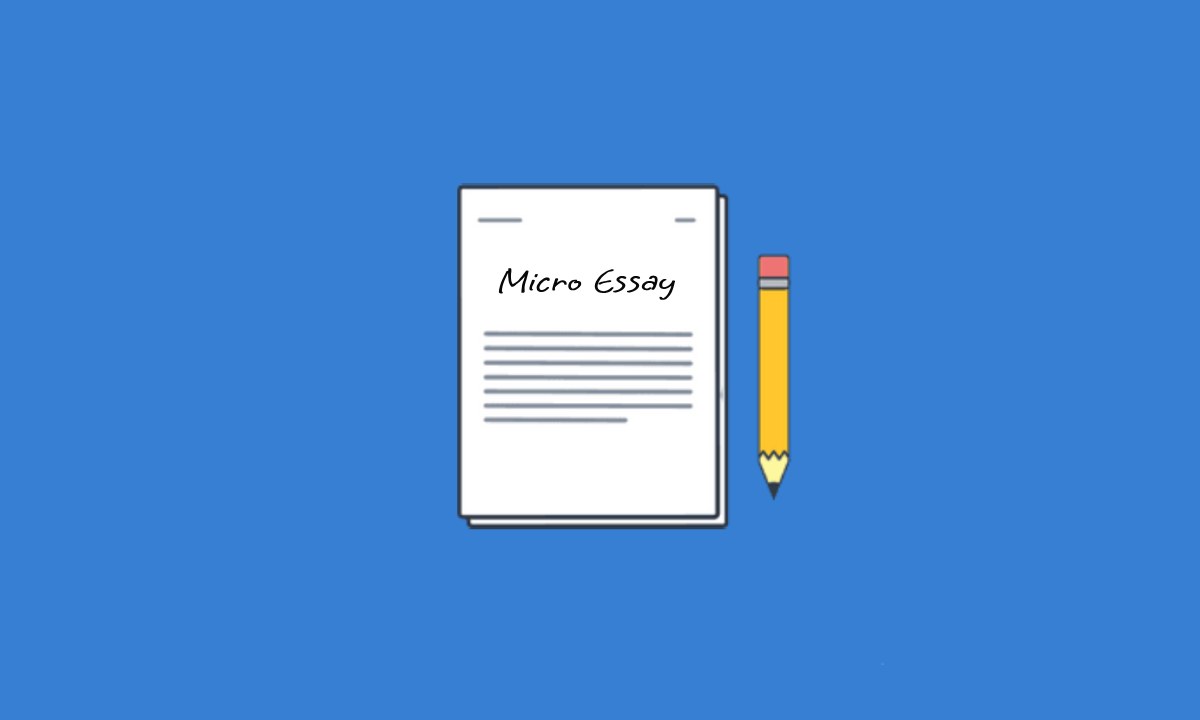
What is a Micro Essay?
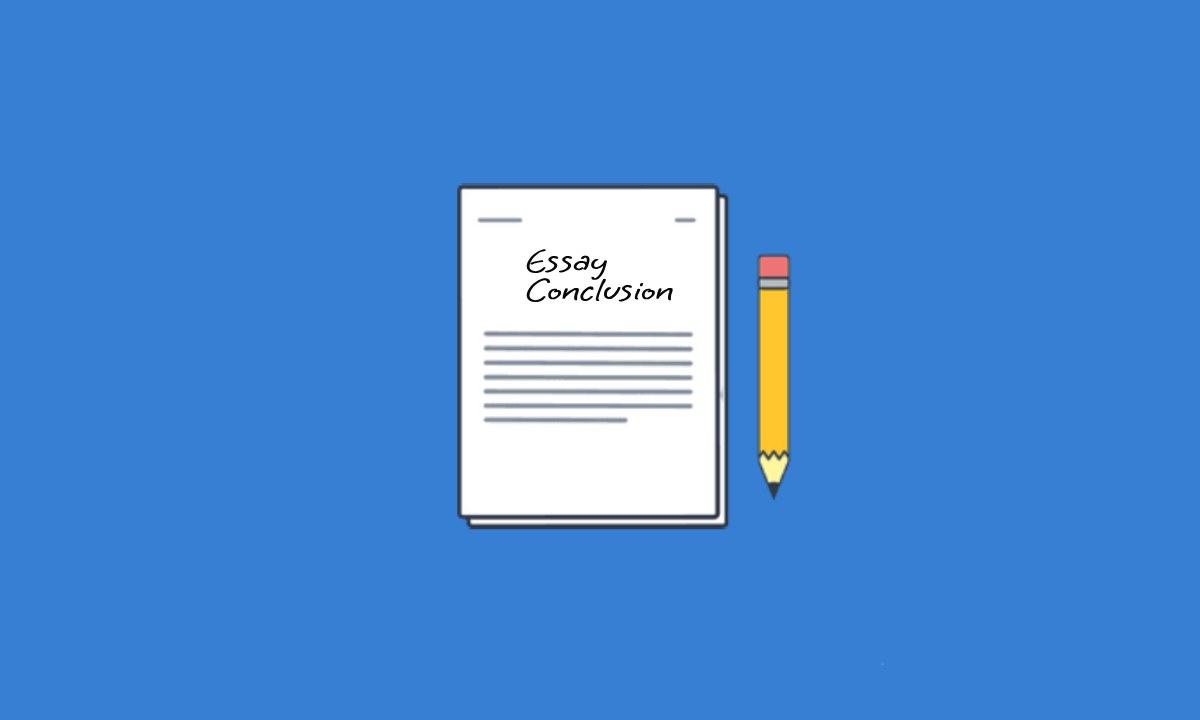
How to Write Conclusion of Essay or Text
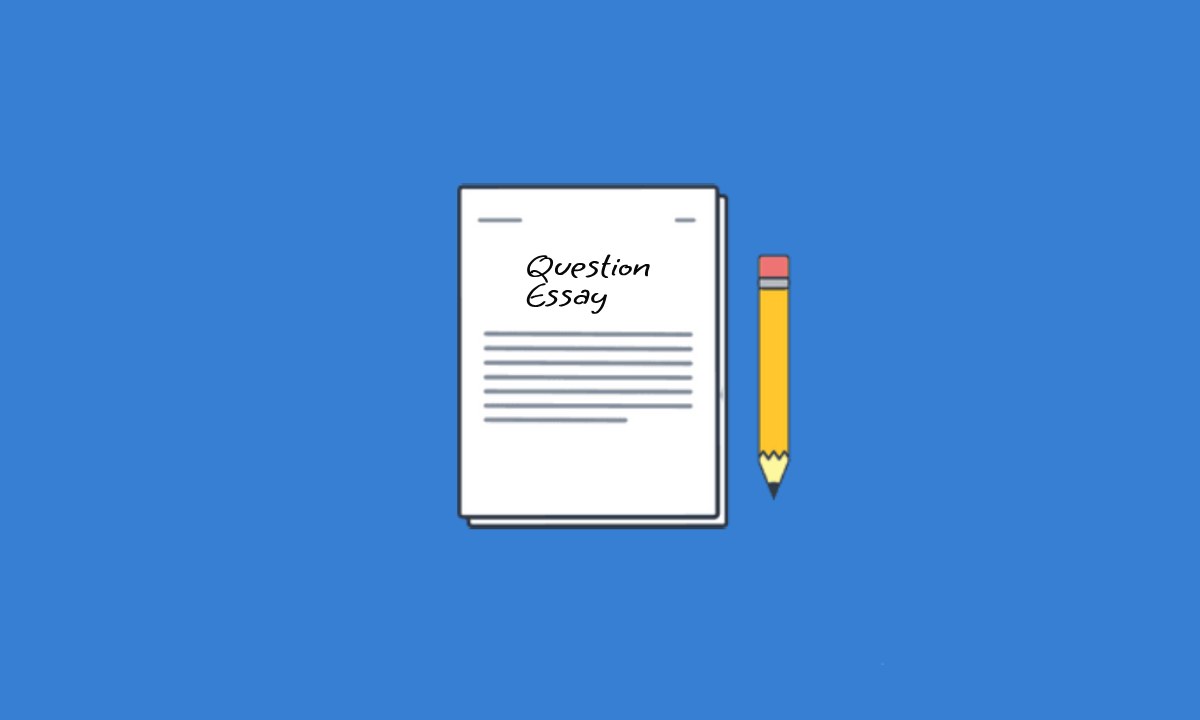
Question Essay: Format, Topics, Example & How-To Guide
- College Essay
- Argumentative Essay
- Expository Essay
- Narrative Essay
- Descriptive Essay
- Scholarship Essay
- Admission Essay
- Reflective Essay
- Nursing Essay
- Economics Essay
Assignments
- Term Papers
- Research Papers
- Case Studies
- Dissertation
- Presentation
- Write My Assignment
- Editing Help
- Cheap Essay Writing
- How to Order
Analytical Essay Guide
Analytical Essay Step by Step Writing Guide
12 min read
-9391.jpg&w=1920&q=75)
People also read
Interesting Analytical Essay Topics Ideas for Students
15 Analytical Essay Samples to Learn From - Tips Included
How to Craft Analytical Essay Outline? An Easy Guide
Analytical essays let you express your critical thinking abilities and deepen your understanding of complex subjects. However, they are not easy to write.
In fact, analytical essays are some of the most challenging but also some of the most highly-rewarded writing assignments. That’s why mastering the art of analytical essay writing can prove invaluable.
In this guide, you will get some helpful writing steps, tips, and essay examples to introduce you to analytical writing. With these resources, you will be able to write an exceptional analytical essay from start to finish.
Let’s get started!
- 1. What Is an Analytical Essay?
- 2. H2- How To Structure An Analytical Essay?
- 3. How to Write an Analytical Essay?
- 4. Analytical Essay Formatting
- 5. Analytical Essay Examples
- 6. Best Analytical Essay Topics Ideas
What Is an Analytical Essay?
“Analytical essays are essays that aim to examine, interpret, and dissect a specific topic or subject matter.”
These types of essay requires a deeper level of analysis of the topic. Analysis writing involves breaking down a topic into relevant parts and an examination and interpreting these parts to make up a cohesive understanding of that topic.
They are commonly assigned in academic settings across various disciplines, including literature, social sciences, and business and finance.
Characteristics of Analytical Essays
Analytical essays are defined by several characteristics, including:
- Objective Analysis: Focuses on evaluating facts and evidence without personal bias.
- Evidence-Based: Uses data, quotes, examples, and scholarly sources to support arguments.
- Focus on Complexity: Examines multifaceted topics, exploring ambiguities and multiple perspectives.
- Critical Thinking: Involves assessing the strengths and weaknesses of various arguments and interpretations.
Types of Analytical Essay
These are some of the common types of analytical essays, each with its unique focus and approach to analysis. Depending on the subject matter and the requirements of the assignment, writers may employ one or more of these types to conduct a thorough analysis.
- Literary Analysis Essay
- Rhetorical Analysis Essay
- Character Analysis Essay
- Critical Analysis Essay
- Comparative Analysis Essay
- Process Analysis Essay
- Data Analysis Essay
- Historical Analysis Essay
H2- How To Structure An Analytical Essay?
A well-structured analytical essay typically follows a standard format that includes an introduction, body paragraphs, and a conclusion.
Here is how to structure an analytical essay:
How to Write an Analytical Essay?
Now that you know what an analytical essay is, let’s get into the writing steps involved in writing. You can follow this simple 5-step process to produce a good analytical essay.
Step 1 - Brainstorm for a Clear Topic
Start by selecting a topic that interests you and aligns with the assignment's guidelines. It's essential to choose a subject with enough depth for analysis. Avoid topics that are too broad or too narrow.
Tip: Students often confuse analytical essays with descriptive essays . While a descriptive essay focuses on detailing a topic, an analytical essay goes deeper to examine and interpret its elements.
Step 2 - Research and Gather Evidence
Conduct thorough research to gather relevant evidence, examples, data, or quotes that support your main ideas. Ensure your sources are credible and appropriate for your academic level.
Step 3 - Develop a Clear Thesis Statement
Craft a concise and focused thesis statement that outlines the central argument or perspective you will analyze in your essay. Your thesis statement should be specific and debatable, serving as the essay's guiding point.
Step 4 - Create an Outline
Organize your essay's structure with an outline. Plan the main points you want to address in each body paragraph, ensuring a logical flow of ideas. Your outline should include an introduction, body paragraphs, and a conclusion.
For an extensive exploration of outlining your essay, visit our blog post on crafting an analytical essay outline .
Step 5- Write the Introduction
Introduce your topic and thesis. Start with a hook to capture interest, provide some background information, and present your thesis statement. Set the stage for your analysis.
Here is what a good essay introduction includes:
- It begins with a compelling hook statement that captures your reader's attention. The opening sentence could be a fact, quote, or an observation that is meant to draw the reader in and to make them read onwards.
- Provide essential context to orient your audience.
- Finally, present a clear and concise thesis statement that outlines the main argument of your essay. The thesis statement is the central part of your introduction as it clarifies your main focus.
Step 6- Develop Body Paragraphs
The body paragraphs of your analytical essay are where the real substance of your analysis takes place. This is where you delve deep into your topic, examine evidence, and present your arguments with precision.
To craft effective body paragraphs, follow these essential guidelines:
- Start with a Clear Topic Sentence
Each body paragraph should begin with a clear and concise topic sentence that introduces the main point or argument you'll be addressing in that specific paragraph. This sentence sets the tone and direction for the entire paragraph.
- Provide Supporting Evidence and Examples
Support your analysis with concrete evidence and examples. This can include primary sources, quotations from texts, data from research, historical events, or any relevant information that strengthens your argument. Ensure that the evidence you choose directly relates to your thesis statement.
- Analyze the Evidence
Don't stop at presenting evidence—analyze it. Explain the significance of the evidence and how it supports your argument. Dive into the details, exploring the "how" and "why" behind your analysis. This is where your critical thinking skills shine.
- Maintain a Logical Flow
Ensure that your paragraphs have a logical flow. Transition smoothly between ideas to maintain coherence in your essay. Consider using transitional phrases or sentences to guide readers through your analysis.
Step 7 - Conclude your Essay and Revise
Finally, conclude your essay by summarizing your key points and reinforcing your thesis.
The conclusion of an analytical essay provides a synthesis of the arguments presented in the essay. It presents a cohesive picture of the topic after breaking it down in the body paragraphs.
The conclusion of an analytical essay consists of the same parts as any other essay conclusion . Here is how it’s done:
- The writer should restate the thesis statement and concisely mention the main arguments.
- The conclusion finally ends with a strong closing statement, which can be a food for thought, a question for further research, or a compelling observation.
After writing your essay, take time to revise and proofread. Check for clarity, coherence, and logical flow. Ensure that each paragraph transitions smoothly to the next and that your thesis is consistently supported throughout. Correct any grammatical or spelling errors.
Remember, the uniqueness of an analytical essay lies in its depth of analysis and interpretation. Unlike expository or persuasive essays , it requires you to critically engage with the topic and provide a detailed examination of its components.
By following these steps, you can effectively write an analytical essay that is well-structured, insightful, and compelling.
Analytical Essay Formatting
When formatting an analytical essay, it's important to adhere to certain guidelines to ensure clarity, coherence, and professionalism.
Here's how you can format your analytical essay:
- Use standard margins (1 inch) on all sides of the page.
- Include page numbers in the header or footer, aligned to the right margin.
- Title your essay at the top of the first page, centered and in bold or italics .
- Use headings and subheadings to organize your analysis if necessary.
- Follow any specific formatting guidelines provided by your instructor or institution.
- When submitting your analytical essay electronically, save the document in a common file format such as Microsoft Word (.docx) or PDF (.pdf).
- Make sure that your document is properly formatted and free of any formatting errors before submission.
- Analytical essays can be written in a formal, academic style. Avoid informal language and maintain an objective tone throughout.
- Depending on your field of study, you may be required to use a specific citation style such as APA , MLA , or Chicago .
Make sure to follow the guidelines of the chosen citation style for citing sources within the text and in the bibliography or references section.
Analytical Essay Examples
Read these analytical essay examples to gain a clearer understanding of how analytical essays work.
Let’s take a look at a short analytical essay example:
Here are some PDF samples that you can read and download for free. Check them out:
Literary Analytical Essay Example
Analytical Essay Sample
These are just a few examples. For more, check out our analytical essay examples guide to get plenty of ideas.
Best Analytical Essay Topics Ideas
Do you want to try writing your own analytical essay for practice and need topic suggestions? Here are ten analytical essay prompt topic ideas for you.
- Analyze the symbolism of the "green light" in F. Scott Fitzgerald's "The Great Gatsby."
- Analyze the foreign policy decisions that led to a significant historical conflict.
- Explore the impact of gerrymandering on the democratic process in a specific country.
- Examine the economic consequences of a major financial crisis, such as the 2008 global recession.
- Analyze the impact of globalization on the economies of developing nations.
- Analyze the concept of justice in Plato's "The Republic."
- Examine the ethical dilemmas surrounding euthanasia and assisted suicide.
- Analyze the existentialist themes in the works of Jean-Paul Sartre.
- Analyze the role of propaganda in shaping public opinion during a political campaign.
- Analyze the cultural significance of a specific religious festival or tradition.
Need more ideas? Check out our list of more than 100 analytical essay topics to help you out!
In Conclusion,
Analytical essay writing is tough, but it’s also the most satisfying and rewarding. Writing an analytical essay can greatly broaden your understanding of a topic. By following the steps, tips, and examples provided in this guide, you're better equipped to embark on your analytical writing journey with confidence.
Remember that practice is key to honing your analytical skills. As you continue to engage with complex subjects and seek feedback, your ability to uncover meaning and offer fresh insights will flourish.
Also, we understand that while writing an analytical essay, you sometimes need a helping hand.
So, if you're looking to pay somebody to do my essay , our professional service is here to help!
With MyPerfectWords.com , you can get help from expert writers at our analytical essay writing service . They will craft fully original and custom-tailored essays for you at the most affordable prices.
So contact our service for college today!
Frequently Asked Questions
What are the four main features of analytical writing.
The 4 main features of analysis essay are:
- Emphasizes impartial evaluation, avoiding personal bias.
- Relies on credible evidence for logical reasoning.
- Involves assessing information for insightful interpretations.
- Prioritizes clear communication of complex ideas.
What is the main purpose of analytical writing?
The primary purpose of analytical writing is to dissect complex subjects or issues, critically evaluate them, and generate informed insights or interpretations. It aims to deepen understanding, challenge assumptions, and contribute to knowledge in a particular field or discipline by analyzing evidence, identifying patterns, and drawing reasoned conclusions.
What are the 5 aspects of analytical thinking?
Five aspects of analytical thinking are:
- Identifying Patterns
- Critical Evaluation
- Problem-Solving
- Inferential Reasoning
- Creative Synthesis

Write Essay Within 60 Seconds!

Nova Allison is a Digital Content Strategist with over eight years of experience. Nova has also worked as a technical and scientific writer. She is majorly involved in developing and reviewing online content plans that engage and resonate with audiences. Nova has a passion for writing that engages and informs her readers.
Struggling With Your Paper?
Get a custom paper written at
With a FREE Turnitin report, and a 100% money-back guarantee
LIMITED TIME ONLY!
Keep reading
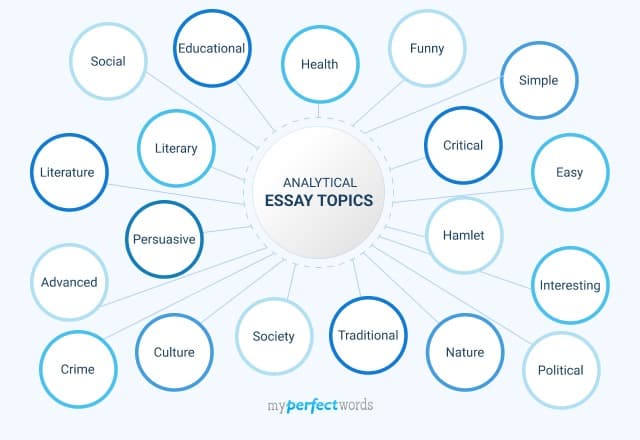
OFFER EXPIRES SOON!

IMAGES
VIDEO
COMMENTS
Importance of Analytical Essay. The aim of analytical essay to start is not to present a story but to analyze and it to make readers understand what the writer intends to accomplish with the essay. Some students who are asked to write an analytical essay tend to tell the readers the next scenario of the story instead of analyzing it.
Analytical Essay Example Title: "Analyzing Orwell's Warning: Themes of Control and Surveillance in '1984'" Analytical Essay Example Introduction: In George Orwell's dystopian novel "1984," the author paints a bleak picture of a totalitarian society where the government exerts complete control over its citizens' lives (Hook).Through the protagonist Winston Smith, Orwell explores themes of ...
Sample Essay 1 received permission from Victoria Morillo to publish, licensed Creative Commons Attribution-NonCommercial-ShareAlike 4.0 International (CC BY-NC-SA 4.0) Sample Essays 2 and 3 adapted from Cordell, Ryan and John Pennington. "2.5: Student Sample Papers" from Creating Literary Analysis. 2012.
An analytical essay is an essay that meticulously and methodically examines a single topic to draw conclusions or prove theories. Although they are used in many fields, analytical essays are often used with art and literature to break down works' creative themes and explore their deeper meanings and symbolism.. Analytical essays are a staple in academics, so if you're a student, chances ...
An analytical essay is just an analysis of a literary text. By contrast, a critical essay involves, not only an analysis of the text in question, but also dissection of the literary terms and devices used by the author to make his meanings clear. The critical essay also explains the functions of the literary terms used, and evaluates their usage, and whether they have achieved the intended ...
A short story analysis essay is a composition that aims to examine the plot and the aspects of the story. In writing this document, the writer needs to take the necessary elements of a short story into account. In addition, one purpose of writing this type of analysis essay is to identify the theme of the story.
Learn all the fundamentals of an analytical essay! Check out six easy-to-follow writing steps, practical analytical essay examples and an effective outline! ... It relies on evidence from the text to logically support arguments, avoiding emotional appeals or personal stories. Unlike persuasive essays, which argue for a specific viewpoint, a ...
Analytical essays come in several types, each designed to analyze different kinds of material or to approach analysis from a unique angle. Below are some common types of analytical essays: 1. Literary Analysis Essay. A literary analysis essay focuses on analyzing a specific piece of literature, such as a novel, poem, play, or short story.
An analytical essay is a type of essay that involves looking at a subject of interest and explaining what it is saying. Whatever topic you choose, your writing better dissect, dissect, dissect.
Tip: Students often confuse analytical essays with descriptive essays. While a descriptive essay focuses on detailing a topic, an analytical essay goes deeper to examine and interpret its elements. Step 2 - Research and Gather Evidence. Conduct thorough research to gather relevant evidence, examples, data, or quotes that support your main ideas.